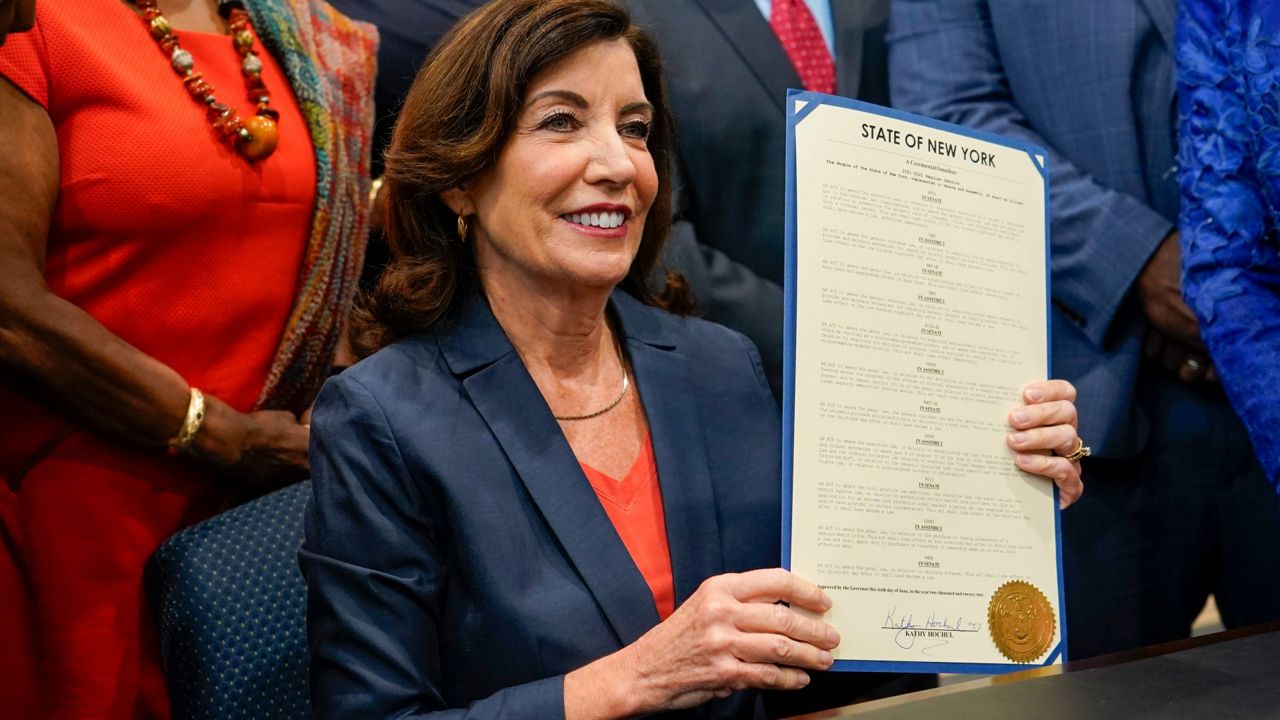In the weeks after what some described as a shocking overturn of ex-media mogul Harvey Weinstein’s 2020 rape conviction, state lawmakers introduced a new bill that they say, if passed into law, would prevent future sex crime cases from similar reversals.
“Feeling that he had not had a fair trial? I never had a trial,” Ambra Battilana Gutierrez said on Thursday. She was one of the women who testified against Harvey Weinstein in 2020, describing her past experiences with him.
But that evidence, and testimony provided by other women, is part of the reason cited that ultimately reversed his 23-year prison sentence.
“Fairness and prejudice to the person accused has to be considered — that’s where we come to the innocent before proven guilty bedrock of our system of trials,” Amanda Jack, an attorney at the Legal Aid Society, said.
The Court of Appeals decided in an April 25 ruling that it was unfair that the judge let women talk about their past experiences with Weinstein during the 2020 trial. The court agreed with his lawyers that those stories were unrelated to his criminal charges. Some state lawmakers disagree.
“This is supporting survivors of sexual offenses, it’s enacting a change that 16 other states have already enacted, the federal government has already enacted,” Michael Gianaris, the Democratic State Senate Deputy Majority Leader from Queens, said during a Thursday press conference in Manhattan.
Gianaris joined forces with Westchester Democrat, Assemblywoman Amy Paulin, to introduce a bill they argue would green light relevant testimony about a person’s past actions related to a sex crime case.
“In sexual assault causes, which typically rely on the testimony of the survivor, it is essential and critical,” Paulin said. “My sister was raped in high school and she decided to press charges. Her attacker pleaded consent.”
Paulin, along with her family, testified at the trial that her sister had never had any sexual experience in the past, but it didn’t change the outcome.
“He walked out of that courtroom free. I have no doubt in my mind that he has assaulted other women,” Paulin said of her sister’s alleged attacker.
If signed by Gov. Kathy Hochul, the act would become law immediately, meaning those witnesses could testify in a new trial against Weinstein.
Manhattan District Attorney Alvin Bragg already said he’s game, and his office is working with lawmakers.
“Our mission to center survivors includes working to ensure our laws reflect the reality of sexual assault while protecting the rights of the accused. We are working hand-in-hand with stakeholders to modernize and clarify New York’s laws pertaining to Molineux evidence so prosecutors around the state can better secure justice for survivors,” Bragg spokeswoman Emily Tuttle said in a statement provided to NY1.
But the Legal Aid Society opposes the bill.
“It’ll create a mini trial within the trial, elongating it, putting someone on the stand reliving a trauma that happened who knows how long ago,” Jack said. “Then we will get back to the main charges and what that allows the prosecution to do is basically say ‘This person has done it before, and so they’ve done it again.’”
Jack argues the judge made a mistake in 2020 by allowing any other women, besides Weinstein accusers Jessica Mann and Mimi Haley, and instead got caught up in the historic #MeToo movement.
“It seems a lot of this was being swept up in that moment and trying so hard to get that conviction, that that overreach was asked for and then granted,” Jack added.
Although bill sponsors say the court would have the ability to accept or dismiss testimony based on whether evidence will “create undue prejudice to the defendant,” according to the bill text, Jack said it’s not enough.
“We can’t forget about the history of wrongful convictions in New York State,” she said. “Harvey Weinstein was a rich movie mogul with resources and power and influence and reach.”
Jack said the legislature should not rush the bill before the end of the legislative session, scheduled for June 6.
“But my concern, again, is about the communities who are over-policed, over-jailed and are mostly in prison — and are black and brown communities from under-resourced areas,” Jack said.
When asked about the bill Thursday at an unrelated Brooklyn-based press conference, Hochul said women in sex crime cases do have a right to be heard — but with appropriate witnesses.
Hochul added that her administration is still examining the new bill.







